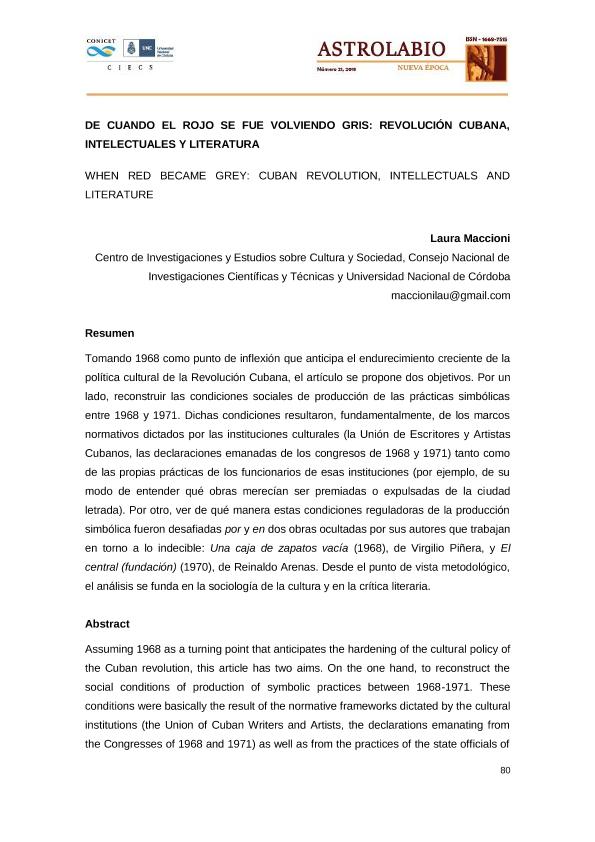Artículo
Tomando 1968 como punto de inflexión que anticipa el endurecimiento creciente de la política cultural de la Revolución Cubana, el artículo se propone dos objetivos. Por un lado, reconstruir las condiciones sociales de producción de las prácticas simbólicas entre 1968 y 1971. Dichas condiciones resultaron, fundamentalmente, de los marcos normativos dictados por las instituciones culturales (la Unión de Escritores y Artistas Cubanos, las declaraciones emanadas de los congresos de 1968 y 1971) tanto como de las propias prácticas de los funcionarios de esas instituciones (por ejemplo, de su modo de entender qué obras merecían ser premiadas o expulsadas de la ciudad letrada). Por otro, ver de qué manera estas condiciones reguladoras de la producción simbólica fueron desafiadas por y en dos obras ocultadas por sus autores que trabajan en torno a lo indecible: Una caja de zapatos vacía (1968), de Virgilio Piñera, y El central (fundación) (1970), de Reinaldo Arenas. Desde el punto de vista metodológico, el análisis se funda en la sociología de la cultura y en la crítica literaria. Assuming 1968 as a turning point that anticipates the hardening of the cultural policy of the Cuban revolution, this article has two aims. On the one hand, to reconstruct the social conditions of production of symbolic practices between 1968-1971. These conditions were basically the result of the normative frameworks dictated by the cultural institutions (the Union of Cuban Writers and Artists, the declarations emanating from the Congresses of 1968 and 1971) as well as from the practices of the state officials of these institutions (for example, of their way of understanding which works deserved to be awarded prizes or expelled from the literate city). On the other hand, we are interested in seeing how these conditions regulating symbolic production were challenged by and in two literary works hidden by their authors in which the unspeakable is said. These texts are Una caja de zapatos vacía (1968), by Virgilio Piñera, and El central (fundación) (1970), by Reinaldo Arenas. From the methodological point of view, the analysis is based on the sociology of culture and literary criticism.
De cuando el rojo se fue volviendo gris: Revolución cubana, intelectuales y literatura
Título:
When red became grey: Cuban revolution, intellectuals and literature
Fecha de publicación:
12/2018
Editorial:
Centro de Investigaciones y Estudios sobre Cultura y Sociedad
Revista:
Astrolabio Nueva Época
ISSN:
1668-7515
Idioma:
Español
Tipo de recurso:
Artículo publicado
Clasificación temática:
Resumen
Palabras clave:
Revolución cubana
,
Intelectuales
,
Virgilio Piñera
,
Reinaldo Arenas
Archivos asociados
Licencia
Identificadores
Colecciones
Articulos(CIECS)
Articulos de CENTRO DE INVESTIGACIONES Y ESTUDIO SOBRE CULTURA Y SOCIEDAD
Articulos de CENTRO DE INVESTIGACIONES Y ESTUDIO SOBRE CULTURA Y SOCIEDAD
Citación
Maccioni, Laura; De cuando el rojo se fue volviendo gris: Revolución cubana, intelectuales y literatura; Centro de Investigaciones y Estudios sobre Cultura y Sociedad; Astrolabio Nueva Época; 21; 12-2018; 80-104
Compartir




